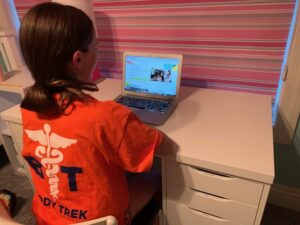As we approach the new school year, more and more schools are moving online to protect the health of students and staff. This can be a tough transition for both students and parents, as this is a social issue we have never previously encountered on this scale.

As a current college student, the past 4 months have required a lot of adaptability on my part as I navigated the end of my senior year, a summer internship and now the beginning of my Master’s degree in public health. Some challenges I have faced during this period of change have been struggling to keep a consistent schedule, dealing with the added stress of finishing my undergraduate degree during an unprecedented time and the reduction in accessibility to the academic resources such as libraries, advisors and professors I had depended on previously. Using trial and error, I have finally managed to find some methods that work very well for me.
Although there is no one-size-fits-all during a global pandemic, here are some ideas I have utilized to help you and your child prepare for the upcoming school year:
- Keep a “School Day” schedule
- Providing your child with the familiar sense of structure that they have grown used to in their typical learning environment will help them keep focused. It will also help maintain a sense of normalcy and keep them from potentially falling behind in coursework.
- Create a study area
- Designating a study area will limit the possibility of distractions. It will also give them some privacy and time away from the rest of the family to really get back into that “at school” mindset. This doesn’t have to be an entire room, but at very least a desk or even the dining room table for a few hours a day.
- Be involved!
- You have now acquired a bigger role in your child’s learning. You can fill that role by maintaining contact with teachers. Become familiar with what your child is learning and discuss it with them. This will not only help your child consolidate what they have learned, but also gives you the perfect opportunity to become an even more supportive part of your child’s life. Your child may not be able to complete some assignments without you. Be flexible and set aside time to work on those tasks when you are able.
- Check in with your child regularly
- Ask them what they learned during dinnertime. Check in with them: How are they feeling? What do they feel they need to be successful? How can you help them improve their learning? They know themselves and their needs best, so provide a safe and open line of communication.
- Be patient
- These are very confusing and scary times for kids (and adults). Your child is trying to navigate these adjustments just as you are. Encourage them to take breaks and step back as needed. They deserve patience and understanding while they settle into a new normal.
Keep in mind that this is all new for your kids too. They may be just as stressed, anxious, and scared as you are. Be patient with them and support them in whatever ways they seem to need, and make sure to follow up with them as the semester goes on. You are their biggest support currently and they depend on you to help keep them on track.
This is also new for you as a parent. Allow yourself the same patience and support as you give your child. Keep in contact with other parents and check in with them on how they are doing and what they have found works for them and their family. You will need time to adjust to this new life balance, but through patience and trial and error, you and your child will make progress every day.
Author: Magdalena Hamielec – Intern – Candor Health Education
